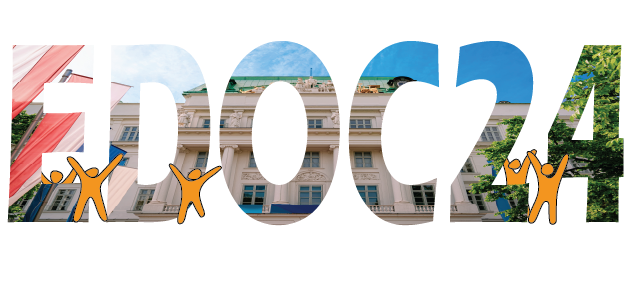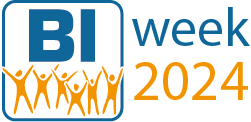EDOC 2024: 28th International Conference on Enterprise Design, Operations and Computing
10-13th September 2024, Vienna, Austria
EDOC 2024 is the 28th conference in the EDOC series. EDOC conferences traditionally provide a key forum for researchers and practitioners in Enterprise Design, Operations and Computing, by addressing the full range of models, methodologies, and engineering technologies contributing to building and evolving intra- and inter-enterprise software systems.
EDOC 2024 will be hosted by the Business Informatics Group (BIG), a research unit of the Institute of Information Systems Engineering at TU Wien Informatics, in Vienna, Austria. It will be part of the Business Informatics Week 2024, being collocated with the 26th International Conference on Business Informatics (CBI 2024).
The conference welcomes high-quality scientific submissions and experience papers from industry. Additionally, expert panel discussions and keynotes will address current topics and issues in this domain.
Important dates
- Submission system opening: 25 March 2024
- First submission round:
15 April 202422 April 2024 - First round notification:
20 May 202427 May 2024 - Abstract submission to second round: 01 July (mandatory & strict)
- Second submission round: 08 July 2024 (strict)
- Second round notification: 22 July 2024
- Author registration deadline: 02 August 2024
- EDOC 2024: 10-13 September 2024
- Camera-ready papers (post-proceedings): 29 September 2024

Topics
- Enterprise Architecture & Engineering
- Methods, Frameworks, Reference Models, and Tools, for Enterprise Architecture
- Enterprise architecture for networked organisations
- Architectural impact of new technologies, including AI, cloud computing, edge computing, blockchain, etc.
- Architecture level concerns, such as interoperability, security, sustainability, etc.
- Service-Oriented Software System Architectures
- Service composition, orchestration and choreography
- Service policies, contract definition and enforcement
- Software & services modeling languages and approaches
- Architectures for cyber-physical systems
- Software architecture level concerns, such as interoperability, security, sustainability, etc.
- Model-Based Software Engineering
- Software engineering methods for enterprise computing
- Model-driven architectures and software development
- Domain specific modeling languages (DSML)
- Engineering of digital twins
- Low code platforms
- Enterprise Cybersecurity
- Sensing and Awareness
- Threat modeling, attack simulation, intrusion detection and prevention
- Access control & SOA security
- Blockchain and enterprise security
- Privacy Preserving Technologies
- Business Process and Business rules
- Process modeling, verification, configuration, architectures and enabling infrastructures
- Process mining and robotic process automation
- Business process agility/flexibility and decision management
- Business rule languages and engines, process compliance
- Semantics and Information Management
- Business object modeling methodologies and approaches
- Enterprise taxonomies, ontologies and business knowledge integration
- Master data management, data mining and (real-time) data
- Data quality and trustworthiness
- Combining data-driven and symbolic modeling approaches
- Modeling in an enterprise context
- Philosophical, linguistic, and mathematical foundations of modeling
- Return on modeling effort
- Design and evolution of modeling languages and frameworks
- Modeling practices and modeling capabilities in enterprises
- Experience reports and case studies on models at work (in an enterprise context)
Submission guidelines
We solicit submissions of scientific papers that describe original results not having been accepted or submitted for publication elsewhere. These papers will be peer-reviewed based on their scientific and technical contribution, originality, and relevance. These also include case studies following a formal case study research method (e.g., involving elaborate and well-structured gathering and processing of data from the case(s)).
Papers should:- be submitted in PDF;
- comply with the Springer LNCS style (an Overleaf LaTeX template is available for your convenience); and
- Have at most 15 pages (excluding references).
Submissions should be made via Easychair: (choose track EDOC)
This year, for the first time, the conference is offering two submission deadlines:- Papers submitted by the first deadline may be accepted or rejected directly in a first review round. Alternatively, authors may be invited to submit a revised version of the paper to a second round for re-examination (with feedback similar to journal submissions).
- Papers submitted by the second deadline are reviewed in the traditional way in one review round.
Review
All papers will be refereed by at least 3 members of the international programme committee, while a dedicated programme board will oversee the general reviewing process.
Publication
The proceedings will be published by Springer in the Lecture Notes in Computer Science (LNCS) series.
Starting this year, EDOC will adopt a post-proceeding format. That is, authors will be allowed to submit the final version of their papers after the conference, having the opportunity to improve them with the feedback received during the conference. To support this, papers may be extended by 1 page.
Participation
Each paper must have one of its authors registered to EDOC 2024 by the author registration deadline (see important dates above). The organizers reserve the right to remove a paper from the proceedings if no author is registered by then.
Only papers presented during the conference will be published in the proceedings.
Organization
General Chairs
- Henderik A. Proper, TU Wien, Austria
- Miguel Mira Sa Silva, University of Lisbon, Portugal
Program Committee Chairs
- José Borbinha, INESC-ID, IST, Universidade de Lisboa, Portugal
- Tiago Prince Sales, University of Twente, The Netherlands
Program Committee
- Alan Wee-Chung Liew, Griffith University, Australia
- Alexander Knapp, Universität Augsburg, Germany
- Alfred Zimmermann, Reutlingen University, Germany
- Amin Beheshti, Macquarie University, Australia
- Andrea Marrella, Sapienza University of Rome, Italy
- Andreas L. Opdahl, University of Bergen, Norway
- Andrew Berry, ResMed Inc, USA
- André Vasconcellos, Universidade de Lisboa, Portugal
- Aniruddha Gokhale, Vanderbilt University, USA
- Artem Polyvyanyy, The University of Melbourne, Australia
- Asif Qumer Gill, University of Technology, Sydney
- Axel Korthaus, Swinburne University of Technology, Australia
- Barbara Weber, University of St. Gallen, Switzerland
- Ben Roelens, Open Universiteit, The Netherlands & Ghent University, Belgium
- Benjamin Yen, The University of Hong Kong, HK
- Carlos Azevedo, Federal Institute of Espírito Santo, Brazil
- Chiara Di Francescomarino, University of Trento, Italy
- Christian Huemer, Vienna University of Technology, Austria
- Christian Zirpins, Karlsruhe University of Applied Sciences, Germany
- Claudenir M. Fonseca, University of Twente, The Netherlands
- Claudio Di Ciccio, Sapienza University of Rome, Italy
- Colin Atkinson, University of Mannheim, Germany
- Cristine Griffo, Eurac Research, Italy
- Dimka Karastoyanova, University of Groningen, The Netherlands
- Dominik Bork, TU Wien, Austria
- Emilio Sulis, University of Turin, Italy
- Fadi Mohsen, University of Groningen, The Netherlands
- Fatih Turkmen, University of Groningen, The Netherlands
- Fethi Rabhi, The University of New South Wales, UK
- Flavia Santoro, Rio de Janeiro State University, Brazil
- Florian Matthes, Technical University of Munich, Germany
- Frank Leymann, University of Stuttgart, Germany
- Frederik Gailly, Ghent University, Belgium
- Georg Grossmann, University of South Australia, Australia
- Georg Weichhart, Primetals, Austria
- Giancarlo Guizzardi, University of Twente, The Netherlands
- Giuseppe Di Lucca, University of Sannio, Italy
- Guido Governatori, Independent Researcher
- Hans Weigand, Tilburg University, The Netherlands
- Hans-Georg Fill, University of Fribourg, Switzerland
- Hiroshi Miyazaki, Keio University, Japan
- Irene Vanderfeesten, KU Leuven, Belgium
- Irina Rychkova, University Paris 1 Pantheon-Sorbonne, France
- Ítalo Olivera, University of Twente, The Netherlands
- Jaap Gordijn, Vrije Universiteit Amsterdam, The Netherlands
- Jan Øyvind Aagedal, Equatex, Norway
- João Moreira, University of Twente, The Netherlands
- João Paulo A. Almeida, Federal University of Espírito Santo, Brazil
- John Mylopoulos, University of Ottawa, Canada
- Jolita Ralyté, University of Geneva, Switzerland
- José Barateiro, University of Algarve, Portugal
- José Raúl Romero, University of Cordoba, Spain
- Julio César Nardi, Federal Institute of Espírito Santo, Brazil
- Julius Köpke, University of Klagenfurt, Austria
- Lam Son Lê, Vietnamese-German University, Vietnam
- Ljiljana Brankovic, University of New England, Australia
- Lorenzo Rossi, University of Camerino, Italy
- Luis Ferreira Pires, University of Twente, The Netherlands
- Madhushi Bandara, University of Technology Sydney, Australia
- Manfred Reichert, University of Ulm, Germany
- Manuel Wimmer, Johannes Kepler University Linz, Austria
- Marco Montali, Free University of Bozen-Bolzano, Italy
- Maria Teresa Gómez López, University of Seville, Spain
- Maria-Eugenia Iacob, University of Twente, The Netherlands
- Marten van Sinderen, University of Twente, The Netherlands
- Mathias Weske, University of Potsdam, Germany
- Mattia Fumagalli, Free University of Bozen-Bolzano, Italy
- Michael Rosemann, Queensland University of Technology, Australia
- Michael Schrefl, University of Linz, Austria
- Monique Snoeck, KU Leuven, Belgium
- Nicolas Herbaut, Université Paris 1 Panthéon-Sorbonne, France
- Oscar Pastor, Universidad Politécnica de Valencia, Spain
- Paulo Ceravolo, University of Milan, Italy
- Paulo Rupino da Cunha, University of Coimbra, Portugal
- Pedro Paulo F. Barcelos, University of Twente, The Netherlands
- Peter Bernus, Griffith University, Australia
- Peter F. Linington, University of Kent, UK
- Peter Fettke, German Research Center for Artificial Intelligence and Saarland University, Germany
- Pierluigi Plebani, Politecnico di Milano, Italy
- Rainer Schmidt, Munich University of Applied Sciences, Germany
- Rajeev Raje, Indiana University–Purdue University Indianapolis, USA
- Remco Dijkman, Eindhoven University of Technology, The Netherlands
- Renata Guizzardi, University of Twente, The Netherlands
- Ronny Seiger, University of St. Gallen, Switzerland
- Rüdiger Pryss, University of Würzburg, Germany
- Ruth Breu, University of Innsbruck, Austria
- Sagar Sunkle, Tata Consultancy Services, India
- Said Assar, Institut Mines-Telecom Business School, France
- Schahram Dustdar, TU Wien, Austria
- Selmin Nurcan, Université Paris 1 Panthéon - Sorbonne, France
- Simon Hacks, Stockholm University, Sweden
- Stefan Tai, TU Berlin, Germany
- Stefanie Rinderle-Ma, Technical University of Munich, Germany
- Sylvain Hallé, Université du Québec à Chicoutimi, Canada
- Tiago Prince Sales, University of Twente, The Netherlands
- Ulrich Frank, Universität Duisburg-Essen, Germany
- Ulrik Franke, KTH Royal Institute of Technology, Sweden
- Uwe Zdun, University of Vienna, Austria
- Vinay Kulkarni, Tata Consultancy Services Research, India
- Wolfgang Maass, Saarland University, Germany
- Yigal Hoffner, Shenkar College of Engineering and Design, Israel
- Zoran Milosevic, Deontik, Australia
